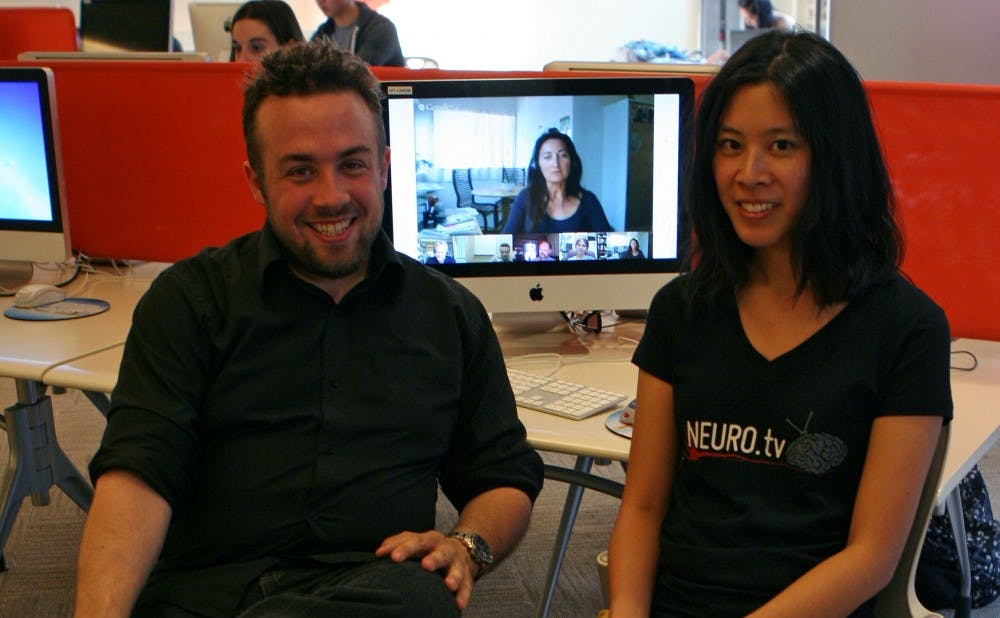Two Duke researchers have teamed up to create a neuroscience education initiative with the promise of changing the relationship between research academia and the general public.
The main masterminds are Jean-Francois Gariepy, a postdoctoral researcher in neurobiology, and Diana Xie, Trinity ‘13, a research assistant. The project, called NEURO.tv, is a webseries that will consist of discussions on a variety of brain-related topics between Gariepy and Xie and top neuroscience researchers. The project, launched on Kickstarter Nov. 1st, has already raised over $17,000 of its $25,000 funding goal.
“The purpose of NEURO.tv is to make academic discussions available for free to everyone on the web,” Gariepy said. “We think that there are some fascinating discussions going on about how our brain works and how we are controlled, and we thought that instead of just losing those discussions in universities between two or three people, we could make them available to everyone.”
Although the disconnect between academics and the public is prevalent across all fields, Gariepy and Xie agree that it is a particularly egregious in neuroscience.
“Neuroscience is one of the hottest science fields right now in terms of popular media coverage, so it provides a lot of opportunities for misconceptions to be spread about it.” Xie said. “When I look at a lot of popular media on neuroscience, it’s usually a lot of generalizations or misinterpretations of the findings—just things to exaggerate what was found in order to market the research in a certain way.”
Many scientists have difficulty translating their research into language the public will understand, Gariepy said. NEURO.tv aims to fill that gap.
“What you see with a lot of other popular neuroscience podcasts and blogs is that they do a good job in making the science sound really cool, but they don’t really go into the details of anything,” Xie said. “And I think that’s because they’re afraid that a lot of people will get really bored. …But what NEURO.tv does is it wants to address that. It doesn’t underestimate the public intelligence and their ability or desire to understand academic concepts.”
Although most other science education initiatives feature a single host explaining a concept on his or her own, another unique aspect of NEURO.tv’s vision is its execution as a series of discussions between multiple experts.
The initial idea for for this format arose from Gariepy’s work as a writer for the neuroscience blog “BrainFacts.” After having a discussion with some of his fellow bloggers, he realized that the types of discussion on the blog could be interesting fodder for a television show, he said.
Gariepy and Xie both feel that the discussion format of NEURO.tv is a crucial step towards improving public critical discourse on new scientific discoveries.
“A show formatted just on presentations of ideas has its problems because scientists are experts at making something sound really slick with no problems or technical difficulties to overcome,” Gariepy said, “But when you force them to answer what they really think about a subject, you capture stuff that you would not have gotten in a presentation, like statements about the weaknesses of a technique.”
The discussion format, according to Gariepy and Xie, is conducive not only to providing the public with information that might otherwise have been glossed over, but also to the willingness of scientists to engage in the task of public education.
“A lot of the feedback that we’ve gotten from the scientists we’ve had on the show is that they feel more comfortable about a lot more things that they otherwise wouldn’t have been able to talk about if this hadn’t been in a discussion format,” Xie said.
Consistent with its purpose of bridging gaps between academics and non-academics, Xie and Gariepy also hope to turn NEURO.tv into a Duke initiative and recruit undergraduate neuroscience students to the project and train them in scientific communication.
Xie noted that NEURO.tv is able to benefit both its viewers and its collaborators by serving as a platform both for education and for training.
Several undergraduates have already signed on to become involved with NEURO.tv, and a number of others have also expressed interest, Xie said.
“If the scientific community embarked on a new frontier that had the potential to change one’s perspective on reality, it would be a shame to see life-changing knowledge remain among the privileged few,” said Cade Netscher, a sophomore neuroscience major and research assistant who has expressed interest in NEURO.tv.
Get The Chronicle straight to your inbox
Signup for our weekly newsletter. Cancel at any time.

